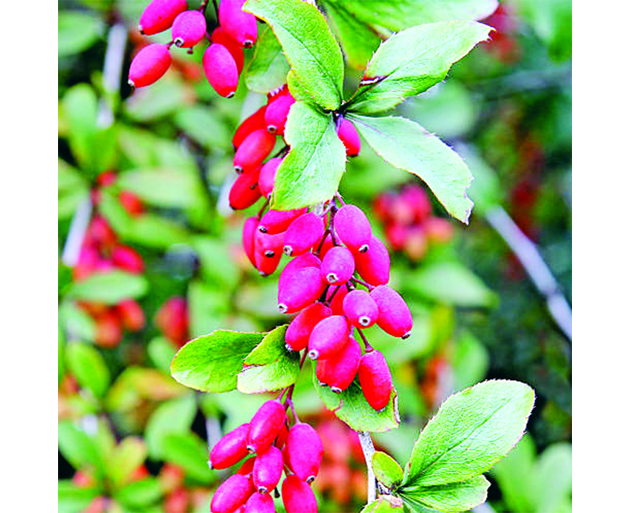Dr Vikas Sharma, Chandan Thappa
Berberis lyceum, commonly known as “Barberry” or “Kashmal,” belonging to Berberidaceae family, is a medicinal plant with immense value. Revered for its rich phytochemical composition /therapeutic properties, this evergreen shrub thrives in arid regions of India, Pakistan, Afghanistan, Iran and has been used for centuries in traditional medicine to treat various ailments. The plant is characterized by its spiny branches, glossy, green, lance-shaped leaves and produces vibrant yellow flowers, followed by small, red, sour-tasting berries that hold the key to its medicinal properties. These berries are rich in active compounds like berberine, palmitic acid, linoleic acid, stearic acid, and various alkaloids, which contribute to its therapeutic effects.
Antimicrobial properties: The primary bioactive compound found in the plant is berberine, which has demonstrated various health benefits. Berberine exhibits potent antimicrobial activity against a broad spectrum of bacteria, viruses, fungi and parasites. It has shown potential in combating infections and supporting antibiotic therapy.
Antidiabetic effects: The studies suggest that berberine may help lower blood sugar levels and improve insulin sensitivity, making it a valuable aid for managing diabetes.
Anticancer potential: The studies have indicated that certain compounds in Berberis lyceum, exhibit anti-cancer properties, inhibiting the growth and proliferation of cancer cells.
Anti-inflammatory: The plant contains compounds like berberine and other alkaloids that possess potent anti-inflammatory properties. This makes it effective in relieving various inflammatory conditions, such as arthritis and skin disorders.
Antioxidant: Berberis lyceum is rich in antioxidants, which combat free radicals and oxidative stress in the body. Regular consumption of the plant’s berries can help prevent cellular damage and reduce the risk of chronic diseases.
Cardiovascular support: Berberine has shown promising effects in improving heart health by reducing cholesterol levels and blood pressure, thus lowering the risk of cardiovascular diseases.
Neuroprotective properties: The research indicates that berberine may have neuroprotective effects, potentially benefiting conditions like Alzheimer’s disease and cognitive decline.
Wound healing: The leaves and berries of Berberis lyceum have been found to possess wound healing properties, aiding in the recovery of injuries.
Immune booster: It is renowned for its immune-stimulating properties. Consuming its berries or extracts is believed to enhance the body’s natural defense mechanisms, protecting against infections and boosting overall immunity.
Digestive health: In traditional medicine, Berberis lyceum has been used to aid digestion and alleviate gastrointestinal discomfort. It can help in promoting healthy bowel movements and treating issues like indigestion and constipation.
Berberis lyceum, the Barberry, is really a treasure trove of medicinal benefits. Its extensive use in traditional medicine has been vindicated by modern scientific research, solidifying its status as a valuable medicinal plant. As we delve deeper into the realm of natural remedies, Berberis lyceum continues to offer immense promise for the treatment and prevention of various ailments. However, it is essential to approach its use with caution, as concentrated extracts may have side effects and interact with certain medications. Consulting a qualified healthcare professional before incorporating Berberis lyceum into one’s healthcare regimen is advised.
(The authors are from the Division of Biochemistry, FBSc. SKUAST-Jammu)
Trending Now
E-Paper


